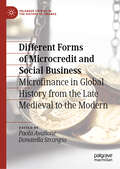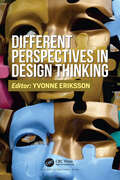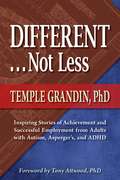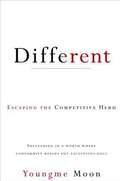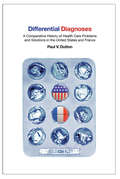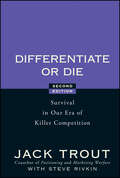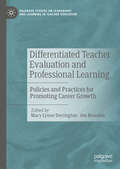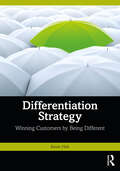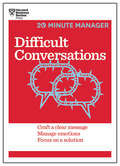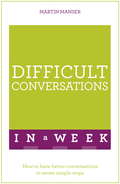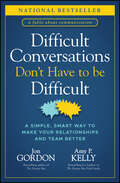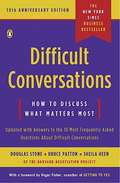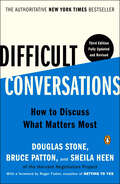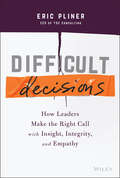- Table View
- List View
Different Forms of Microcredit and Social Business: Microfinance in Global History from the Late Medieval to the Modern (Palgrave Studies in the History of Finance)
by Donatella Strangio Paola AvalloneThis edited collection discusses the evolution of microfinance and social business from the late medieval period to the modern era. The book fills a gap in financial history by exploring lesser-known, informal forms of credit granted to the poorest people, which have often not been recorded in writing. The book highlights the particularly innovative forms of credit developed in Italy, but also includes global contributions on the presence of microfinance and social business across Europe, Asia, and the Middle East. This book illuminates for different countries and periods forms of financial assistance available for those not deemed as creditworthy – whether through the institution of the Monti di Pietà, an Italian credit instrument of the late Middle Ages, loans granted by shopkeepers, pawnbroking, or mutual aid distributed by lottery or religious institutions. The geographical diversity of the chapters enables comparative analyses to be drawn between different forms of credit and financial systems as they developed over a long period. The research presented offers new perspectives for contemporary microfinance, as well as reconstructing the experience of those living in poverty in a range of social, economic and religious contexts. The book will be of interest to a broad readership, including those working in financial, economic and social history.
Different Perspectives in Design Thinking
by Yvonne ErikssonGlobalization and digitalization are buzz words in contemporary society. They affect both our private and our professional lives. Society has become more diverse with easier access to information and to virtual platforms that gives us opportunity to be in touch with colleagues, friends, family, etc. at any time. A complex environment is emerging wherein internet of things and big data are being integrated with products, production systems, healthcare, and daily activity and play an important part in decision making. This has an impact on future designs and the role of designers. Responsible designers with a holistic perspective are needed.The book highlights several aspects of design thinking such as Information Design and Critical Design. The meaning of culture, gender and disabilities are also discussed. The functions of Information Design are changing from ‘showing the way’, instruction manuals and graphic design. It will affect among others, healthcare technology, smart products and Industry 4.0. Design thinking perspective that includes users from the entire chain and from the producer to the end user of the product or service, is needed. This will also require gender and culture issues to be taken into consideration in designing products and services. Design thinking methods and critical aspects of design will contribute to an inclusive society.
Different Perspectives on the Syrian Reality: Research in the Diverse Fields of Syrian Culture
by Ettijahat Independent CultureThis unique collection from Syria presents research papers focusing on topics in cultural research that are relevant to the current Syrian situation, especially with regard to the fundamental changes in the relationship of Syrians to the society they live in and the dynamic transformations they are witnessing. Through these inside views, the volume offers a fascinating alternative narrative of the current societal context in Syria. It comprises the following papers:1. Features of the Home in a Refugee Camp: An Applied Study of the Al-Jarahiya Camp (by Alina Oueishek)2. The Tormented Body Imagery in Contemporary Syrian Plastic Art (by Mohammad Omran)3. Children in the Shadow of the Islamic State: Jihadi Schooling and Recruitment under the Darkness of the Islamic State (by Wasim Al-Salti)4. Political Stereotypes during the Syrian Uprising (by Hani Al-Telfah).
Different Roles for Different Boards: Rethinking Board Design
by Jay W. Lorsch Colin B. CarterDefining the role of a board is the first step in effective board design. This chapter provides a framework to help boards think about what their duties should be.
Different, Not Less: Inspiring Stories of Achievement and Successful Employment From Adults With Autism, Asperger's, and ADHD
by Temple Grandin Tony Attwood<p>Temple Grandin offers the world yet another great work, an inspiring and informative book that offers both hope and encouragement. <p>In these pages, Temple presents the personal success stories of fourteen unique individuals that illustrate the extraordinary potential of those on the autism spectrum. <p>One of Temple’s primary missions is to help people with autism, Asperger’s Syndrome, and ADHD tap into their hidden abilities. Temple chose these contributors from a wide variety of different skill sets to show how it can be done. Each individual tells their own story in their own words about their lives, relationships, and eventual careers. The contributors also share how they dealt with issues they confronted while growing up, such as bullying, making eye contact, and honing social skills. <p><i>Different...Not Less</i> shows how, with work, each of the contributors: <p> <li>Found invaluable mentors <li>Learned skills necessary for employment when young <li>Became successfully employed <li>Developed self-confidence <li>Faced the challenges of forming and maintaining relationships (and sometimes) Raised families</li> </p>
Different: Escaping the Competitive Herd
by Youngme MoonEvery few years a book-through a combination of the author's unique voice, storytelling ability, wit, and insight-simply breaks the mold. Bill Bryson's A Walk in the Woods is one example. Richard Feynman's "Surely You're Joking, Mr. Feynman!" is another. Now comes Youngme Moon's Different, a book for "people who don't read business books. " Actually, it's more like a personal conversation with a friend who has thought deeply about how the world works . . . and who gets you to see that world in a completely new light. If there is one strain of conventional wisdom pervading every company in every industry, it's the absolute importance of "competing like crazy. " Youngme Moon's message is simply "Get off this treadmill that's taking you nowhere. Going tit for tat and adding features, augmentations, and gimmicks to beat the competition has the perverse result of making you like everyone else. " Different provides a highly original perspective on what it means to offer something that is meaningfully different-different in a manner that is both fundamental and comprehensive. Youngme Moon identifies the outliers, the mavericks, the iconoclasts-the players who have thoughtfully rejected orthodoxy in favor of an approach that is more adventurous. Some are even "hostile," almost daring you to buy what they are selling. The MINI Cooper was launched with fearless abandon: "Worried that this car is too small? Look here. It's even smaller than you think. " These are players that strike a genuine chord with even the most jaded consumers. In fact, almost every success story of the past two decades has been an exception to the rule. Simply go to your computer and compare AOL and Yahoo! with Google. The former pile on feature upon feature to their home pages, while Google is like an austere boutique, dominating a category filled with "extras. " Different shows how to succeed in a world where conformity reigns. . . but exceptions rule.
Differential Diagnoses
by Paul V. DuttonAlthough the United States spends 16 percent of its gross domestic product on health care, more than 46 million people have no insurance coverage, while one in four Americans report difficulty paying for medical care. Indeed, the U. S. health care system, despite being the most expensive health care system in the world, ranked thirty-seventh in a comprehensive World Health Organization report. With health care spending only expected to increase, Americans are again debating new ideas for expanding coverage and cutting costs. According to the historian Paul V. Dutton, Americans should look to France, whose health care system captured the World Health Organization's number-one spot. In Differential Diagnoses, Dutton debunks a common misconception among Americans that European health care systems are essentially similar to each other and vastly different from U. S. health care. In fact, the Americans and the French both distrust "socialized medicine. " Both peoples cherish patient choice, independent physicians, medical practice freedoms, and private insurers in a qualitatively different way than the Canadians, the British, and many others. The United States and France have struggled with the same ideals of liberty and equality, but one country followed a path that led to universal health insurance; the other embraced private insurers and has only guaranteed coverage for the elderly and the very poor. How has France reconciled the competing ideals of individual liberty and social equality to assure universal coverage while protecting patient and practitioner freedoms? What can Americans learn from the French experience, and what can the French learn from the U. S. example? Differential Diagnoses answers these questions by comparing how employers, labor unions, insurers, political groups, the state, and medical professionals have shaped their nations' health care systems from the early years of the twentieth century to the present day.
Differential Games in Industrial Economics
by Luca LambertiniGame theory has revolutionised our understanding of industrial organisation and the traditional theory of the firm. Despite these advances, industrial economists have tended to rely on a restricted set of tools from game theory, focusing on static and repeated games to analyse firm structure and behaviour. <P><P>Luca Lambertini, a leading expert on the application of differential game theory to economics, argues that many dynamic phenomena in industrial organisation (such as monopoly, oligopoly, advertising, R&D races) can be better understood and analysed through the use of differential games. After illustrating the basic elements of the theory, Lambertini guides the reader through the main models, spanning from optimal control problems describing the behaviour of a monopolist through to oligopoly games in which firms' strategies include prices, quantities and investments. <P>This approach will be of great value to students and researchers in economics and those interested in advanced applications of game theory.<P> Explains the mathematical treatment of the core models.<P> Covers growth theory, environmental and resource economics and international trade.<P> Includes a tutorial on optimal control and differential game theory.<P>
Differentiate or Die
by Jack Trout Steve RivkinA newly revised and expanded edition of the revolutionary business classic, Differentiate or Die, Second Edition shows you how to differentiate your products, services, and business in order to dominate the competition. Veteran marketing guru Jack Trout uses real-world examples and his own unique insight to show you how to bind customers to your products for long-term success and loyalty. This edition includes new case studies, new research, and updated examples from around the world.
Differentiated Teacher Evaluation and Professional Learning: Policies and Practices for Promoting Career Growth (Palgrave Studies on Leadership and Learning in Teacher Education)
by Mary Lynne Derrington Jim BrandonThis book discusses teacher evaluation and how it can provide the foundations for professional development. The editors and contributors illustrate how teachers with varying levels of expertise, experience and learning needs can benefit from differentiated evaluation and professional development designed to help them reach their full potential. The book examines various aspects of differentiation including levels of experience from pre-service to veteran, practices of school principals as they supervise and evaluate staff, and wider education policies that can support or hinder differentiation. Providing fascinating insights into how teacher evaluation policies can support practice in a variety of contexts, this timely collection will be of interest and value to students and scholars of teacher evaluation and professional development.
Differentiation Strategy: Winning Customers by Being Different
by Kevin W. HoltThis comprehensive and richly illustrated book explains how to create a differentiation strategy—a strategy for being different in a way that causes customers to prefer your products and services to those of your competitors. Filled with frameworks, tools, and templates, this book will enable you to create a compelling answer to your customers’ most fundamental question: Why should I buy from you instead of your competitors? What makes you different? The first half of the book provides an in-depth analysis of the concepts and principles that underlie the practice of differentiation, including the meaning of competitive advantage, competitive strategy, and customer-perceived value. The second half of the book explains how to create a differentiation strategy by identifying the target of your strategy, using customer research and creative problem-solving to design a unique offering, devising a value proposition that emphasizes a key benefit and the reasons to believe you will deliver the benefit, and designing the activity system that will implement your differentiation strategy. Business leaders in companies large and small, business students, and leaders in government, higher education, and the non-profit sector will gain a deep understanding of all that goes into creating a successful, difficult-to-copy differentiation strategy.
Difficult Conversations (HBR 20-Minute Manager Series)
by Harvard Business ReviewYou have to talk with a colleague about a fraught situation, but you're worried that they'll yell, or blame you, or shut down. You fear your emotions could block you from a resolution. But you can communicate in a way that's constructive-not combative. Difficult Conversations walks you through: Uncovering the root cause of friction Maintaining a positive mind-set Untangling the problem together Agreeing on a way forwardAbout HBR's 20-Minute Manager Series:Don't have much time? Get up to speed fast on the most essential business skills with HBR's 20-Minute Manager series. Whether you need a crash course or a brief refresher, each book in the series is a concise, practical primer that will help you brush up on a key management topic.Advice you can quickly read and apply, for ambitious professionals and aspiring executives-from the most trusted source in business. Also available as an ebook. professionals and aspiring executives-from the most trusted source in business. Also available as an ebook.
Difficult Conversations At Work in a Week: Teach Yourself
by Martin ManserSunday: Why are conversations difficult?Monday: Considering emotionsTuesday: Listening wellWednesday: Treating colleagues with respectTheusday: Preparing wellFriday: Seeking changeSaturday: Develop trusting relationships
Difficult Conversations Don't Have to Be Difficult: A Simple, Smart Way to Make Your Relationships and Team Better (Jon Gordon)
by Jon Gordon Amy P. KellyHelp your team maximize their full potential by mastering tough conversations In Difficult Conversations Don’t Have to be Difficult: A Simple, Smart Way to Make Your Relationships and Team Better, bestselling author Jon Gordon and veteran human resources professional and executive coach Amy P. Kelly deliver an engaging and inspiring new take on how to make tough workplace conversations an asset in building a stronger team and organization. The book, written as a business fable, follows Ruth, the CEO of a successful multinational company who has been instructed by her board to prepare her company for sale. Along the way, she must lead an underperforming and dysfunctional team to set aside their differences and work together toward a common goal. This includes growing herself while elevating her team’s performance. As Ruth discovers the secret to unlocking extraordinary growth and productivity, you’ll learn about: The critically important conversations you need to have with your team to realize outstanding results Structuring, planning, and having the tough conversations your team members really need Ensuring your team walks away from difficult conversations more united, motivated, inspired, and positioned for optimal growth and performance Perfect for managers, executives, directors, and business leaders and their teams, Difficult Conversations Don’t Have to be Difficult is also a must-read for coaches, trainers, teachers, consultants, and other professionals doing their best to help others realize their full potential. Teams who read the book together will be equipped with a proven strategy and process to enhance communication performance and unity.
Difficult Conversations In A Week: How To Have Better Conversations In Seven Simple Steps
by Martin ManserDifficult conversations just got easierHow do you deal professionally with a colleague whose work is seriously below standard? A supplier who is always late? Saying 'no' graciously? Giving someone bad news? Many of us have been on the receiving end of business conversations that have been badly handled, poorly timed or scarcely prepared for by the person we're talking to. This practical book offers help to new and aspiring managers in a variety of business situations, such as delivering bad news in an appraisal, and how to work with a range of colleagues who may be lazy, negative orincompetent.Whether you choose to read it in a week or in a single sitting, Difficult Conversations In A Week is your fastest route to success:- Sunday: Why are some conversations difficult? We may tend to avoid difficult conversations: how else can you deal with them? - Monday: Manage your emotions Distinguish the facts of an incident and how colleagues feel about it and their sense of identity.- Tuesday: Prepare well The venue, atmosphere and timing of a difficult conversation are all important. It is essential that you prepare well, especially your opening words and the direction that you want the conversation to go in, including alternative ways to resolve the issue.- Wednesday: Listen carefully As you listen, you discover more about your colleague's background and motivation. You also need to learn how to ask incisive questions that get to the root of an issue.- Thursday: Treat colleagues with respect In a difficult conversation, you need to affirm your colleague and continue to listen until they feel heard. You will explain your point of view politely, yet firmly, being neither passive nor aggressive in tone.- Friday: Seek change Involve colleagues in a conversation; learn how to deal with certain kinds of colleagues, for example, those who are lazy, aggressive or shy.- Saturday: Build trusting relationships Work hard to develop strong working relationships, so that when you have to have a difficult conversation, you will be better placed to do sobecause you will know the person better.
Difficult Conversations and Dealing with Challenging Situations at Work: Adjusting as a CEO
by Boris Groysberg Ann LeamonCase
Difficult Conversations and Dealing with Challenging Situations at Work: The Case of the Ineffectual FD
by Boris Groysberg Ann LeamonHarvard Case Study
Difficult Conversations and Dealing with Challenging Situations at Work: The Friend Who Asked for Feedback
by Boris Groysberg Ann LeamonCase
Difficult Conversations and Dealing with Challenging Situations at Work: The Partner Who Didn't Take Part
by Boris Groysberg Ann LeamonCase
Difficult Conversations and Dealing with Challenging Situations at Work: The Questionable Contributions
by Boris Groysberg Ann LeamonCase
Difficult Conversations: How to Discuss What Matters Most
by Bruce Patton Sheila Heen Douglas Stone"What is a difficult conversation? Asking for a raise. Ending a relationship. Saying ""no"" to your boss or spouse. Confronting disrespectful behavior. Apologizing. Conversations we dread, and often handle clumsily as a result, are part of all our lives: in boardrooms and family rooms, across the negotiation table and the dinner table. Now, Difficult Conversations teaches us how to handle these dialogues with more success and less anxiety. How does it work? Based on fifteen years of research and consultations with thousands of people, Difficult Conversations pinpoints what works. The authors discovered that regardless of context, the same small but crucial errors are what trip us up--and a few key adjustments can make all the difference. * The role of emotions--ours and theirs * The impact of what is said and what is not said * Why admitting our mistakes will put us in a stronger position * The truth behind the myth that women are better at expressing their emotions than men * How to respond productively in the face of personal attacks Who is this for? Filled with examples from everyday life, Difficult Conversations is certain to be a
Difficult Conversations: How to Discuss What Matters Most
by Bruce Patton Sheila Heen Douglas StoneThe 10th-anniversary edition of the New York Times business bestseller-now updated with "Answers to Ten Questions People Ask" We attempt or avoid difficult conversations every day-whether dealing with an underperforming employee, disagreeing with a spouse, or negotiating with a client. From the Harvard Negotiation Project, the organization that brought you Getting to Yes, Difficult Conversations provides a step-by-step approach to having those tough conversations with less stress and more success. you'll learn how to:· Decipher the underlying structure of every difficult conversation· Start a conversation without defensiveness· Listen for the meaning of what is not said· Stay balanced in the face of attacks and accusations· Move from emotion to productive problem solving
Difficult Decisions: How Leaders Make the Right Call with Insight, Integrity, and Empathy
by Eric PlinerWhat do you do when the algorithm doesn’t have the answer? Countless tools and frameworks claim to make decisions objective and bias-free. But in reality, the defining decisions that leaders face are complex ones with subjective information sources and conflicting courses of action. That’s why the toughest choices are left to the leaders, and that’s why formulas won’t answer them. In Difficult Decisions: How Leaders Make the Right Call with Insight, Integrity, and Empathy, leadership expert and CEO of YSC Consulting, Eric Pliner, delivers a set of practical tools for readers to make sense of these complex, subjective decisions quickly and with integrity. It presents a path to understanding your own subjectivity, and how your morals, ethics, and responsibilities affect how leaders make the most important decisions. Difficult Decisions is ideal for executives, managers, and business leaders to examine their own intuition and navigate the most conflicted choices they make. It’s a challenging read and an indispensable resource to help readers develop self-reflection, clarify their values, and ultimately make the choice that is most “right” to them.
